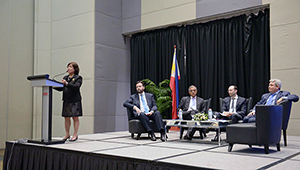Moroccan Union of Inventors Gets Behind IAP
July 8, 2016
The Moroccan Union of Inventors recently undertook a series of awareness-raising activities on the subject of WIPO’s Inventor Assistance Program (IAP) .

The aim of the awareness-raising activities was two-fold: to let more people know about the IAP and to encourage inventors to access the IAP online course, which helps first-time inventors decide whether their invention fulfils patentability requirements.
Mr. Majid El Bouzzaoui, President of the Moroccan Union of Inventors, promoted the IAP during a series of official events and contacted more than 100 people and organizations, among which were inventors, professional associations and universities.
Sponsor support
One of the first sponsors to come on board with the IAP was the International Federation of Inventors’ Associations (IFIA), of which the Moroccan Union of Inventors is an affiliate. IFIA is a very active participant in promoting the program among its members and proactively includes the topic of pro bono legal assistance within its activities.
Sponsors play a crucial role in the IAP. According to the IAP Guiding principles Corporate Supporter Members:
- promote IAP to their internal networks of preferred firms; and
- seek to recruit qualified counsel from these firms to serve as pro bono patent attorneys with the IAP.
Sponsors can be not only corporations, but also associations of attorneys, or global law firms for example. In the case of non-corporate partners, the IAP Steering Committee determines how such partners can contribute to the Program on a case-by-case basis.
Find out more